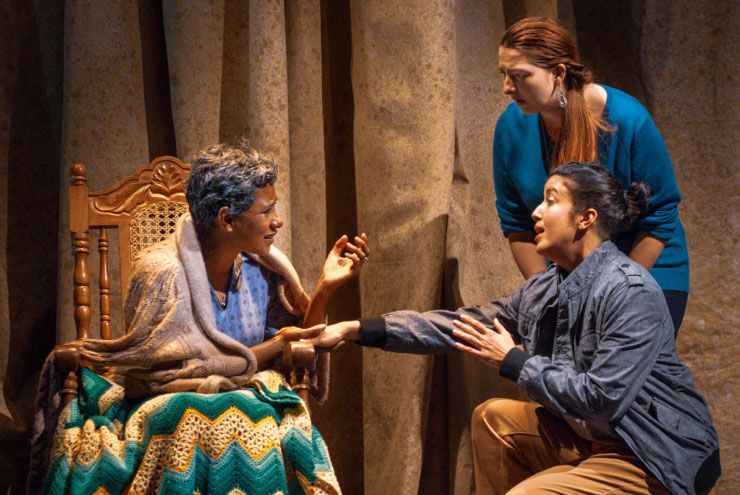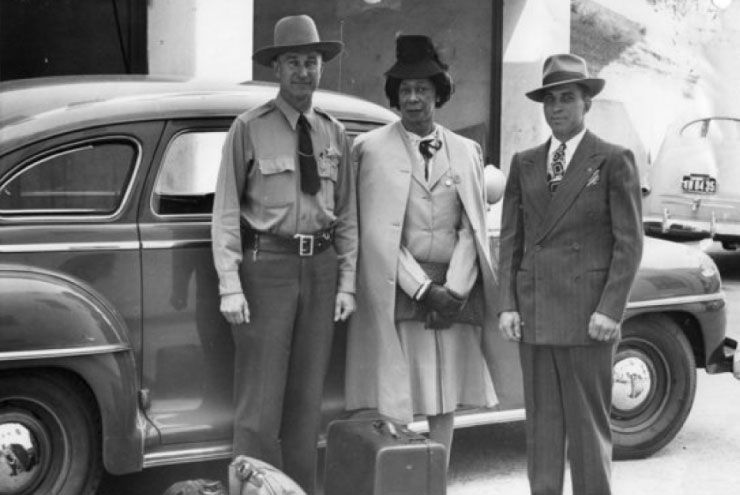By Trevor Boffone
Telling stories about the nuances of queer female sexuality is the core of playwright Christina Quintana’s craft. In an essay about her play Scissoring, Quintana writes: “I love women, I love lesbians, I believe in stories about queer women of color more than anything.” This passion is precisely where Quintana draws inspiration for her latest play, Azul, which receives its world premiere at Southern Rep Theatre in New Orleans from March 27 to April 14, 2019. The production is a particularly noteworthy homecoming for Quintana, who is a New Orleans native and began her professional theatre career with Southern Rep after graduating high school. Under the direction of Estefanía Fadul, Azul is presented in partnership with the Saints and Sinners Literary Festival, a project of the Tennessee Williams/New Orleans Literary Festival.
Quintana’s mission as a writer is “to speak truth to our intersectional lives and untangle the seemingly disparate threads that tie us together.” Azul does just that. The play offers an intersectional portrayal of gender, sexuality, race, and ethnicity to comment on memory, family, and love. Azul spans across multiple generations—over 60 years—in Cuba and New York City, with all three actors playing two roles. The play tells the story of Yadra, who left Castro’s Cuba at age nine. Sixty years later, as Yadra’s Alzheimer’s sets in and she reaches her life’s final moments, her American-born daughter, Zelia, unravels family secrets that have seemingly been forgotten, primarily about her mother’s aunt. While most of Yadra’s family fled the island during the revolution, her aunt stayed in Cuba to be with her lover, another woman. With her wife, Zelia journeys to understand the love that led her mother’s beloved tia-abuela to stay behind. Although Zelia seeks to better understand her family’s queer past, ultimately, she comes to better understand herself.
Fadul was drawn to this play because of its nuanced depiction of characters living between multiple worlds. “This is something that so many people can relate to, whether they are Latinx or not,” notes Fadul. “We are a country of immigrants and our stories are intertwined with other cultures, languages, and traditions around the world. What’s so great about Azul is Quintana’s direct approach to the intersecting identities within us.” The play depicts three different Latinx experiences as each character’s journey through race, sexuality, immigration, language, and love is unique. Complex portrayals of Latinidad are necessary, now more than ever as the Latinx community continues to be the target of the Trump administration.
The impetus to begin writing Azul began thanks to a conversation with actor Ashley Marie Ortiz at the Latinx Theatre Commons Carnaval of New Latinx Work in Chicago in 2015. They wished to push against the male-centered narrative that they felt was pervasive at the festival and see more Latina stories on stage. While lingering on this, Azul came to the playwright. In an interview on the 50 Playwrights Project, Quintana comments:
“I’ve been thinking a great deal about legacy, loss, and invisibility. I’ve always thought about these things, but since my father passed away earlier this year, these ideas are all the more heavy on my heart and in my head. My father was a man who wanted so deeply (and so humanly) to escape his brown skin and his Cubanness. He wanted the brightest future for his children. Most of all, he wanted to be accepted, like we all do. As a Latinx person with lighter skin and limited Spanish, I have finally found the means to tell this story.”
That Azul is receiving its world premiere at Southern Rep is significant for a number of reasons. After Hurricane Katrina, an influx of Latin Americans from Mexico, Central America, and as far away as Brazil and Peru, migrated to New Orleans to help rebuild the city. While the Latinx community has become ingrained in the city in many ways, there is still mainstream resistance to recognizing Latinx contributions to New Orleans. Theatremaker Jose Torres-Tama has been quite vocal about this in the past, noting how the Latinx community has made New Orleans what it is today, yet these stories have been neglected. In recent years alone, the city has been the site of ICE raids on the undocumented population, something that would have been unthinkable just 10 years ago. Torres-Tama has been addressing this, primarily through performances of his solo show Aliens, Immigrants & Other Evildoers and with the Taco Truck Theatre/Teatro Sin Fronteras, an itinerant racially, economically, and geographically diverse theatre company that performs in different communities in the New Orleans area. Despite his successes, Torres-Tama should not have to carry the torch alone.
By and large, Latinx theatre does not have a large presence on New Orleans stages. While the city dons a world-famous reputation for live music, theatre offerings are not as common. Local companies Southern Rep, The Nola Project, Le Petit Theatre, The Tennessee Williams Theatre Company, Jefferson Performing Arts Society, and Tulane Summer Lyric Theatre get most of the press, but none of these organizations routinely offer diverse theatre productions. Azul is the first play by a Latinx playwright that Southern Rep, the city’s largest company and the only one with a national reputation, has produced since its 2013 production of 33 Variations by Moises Kaufman. The last Latinx story on Southern Rep’s stage was Carlo Alban’s Intríngulis in 2011. The production of Azul arrives in a New Orleans that, according to Quintana, is a different city than where she grew up. With the Latinx population rising post-Katrina, Quintana exclaims, “Now you hear Spanish in the streets and there are Latinx grocery stores like never before! It’s beautiful.”
Any one of the aforementioned examples of lack render Azul an important intervention in New Orleans theatre. Yet, Quintana’s play is not only a Latinx play but is also a definitively queer piece of theatre. The relevance of this should not be lost on anyone. Queerness has historically been silenced in both Cuba and the United States to varying degrees. While queer people in Cuba have had to deal with oppressive conditions during the Castro regime, silencing in the United States has been just as systemic. Even so, in Quintana’s experience, silencing queerness was part of her upbringing in New Orleans, primarily as a result of her family and conservative Catholic schooling.
For Quintana, having a world premiere in New Orleans is “beyond surreal.” Quintana began interning at Southern Rep when she was 19 while the organization was recovering from Hurricane Katrina. “I did every job imaginable,” notes Quintana. “Box office, run crew, prop shopping, answering emails, folding programs—you name it. I loved it. I learned so much.” As such, learning that the company was interested in producing Azul was a moving experience for Quintana. Not only did she begin writing her first full-length play while working there, Quintana was encouraged to write plays by working at the company, making this homecoming even more meaningful.
As Azul opens in New Orleans, may it be a sign of things to come in the Crescent City. Having more cultural productions that speak to intersectional identities—namely queer Latinx ones—can only add to what already makes New Orleans a queer haven in the South.
Southern Rep Theatre’s production of Azul runs March 27 through April 14, 2019, at 2541 Bayou Rd., New Orleans, LA. Click here for ticket information.







